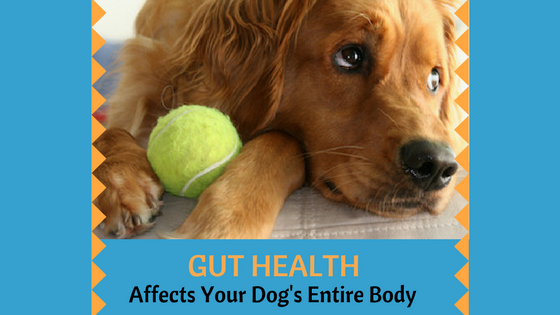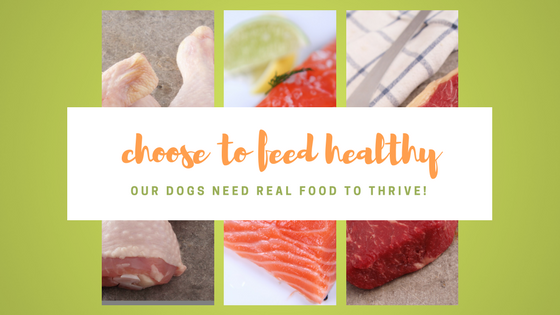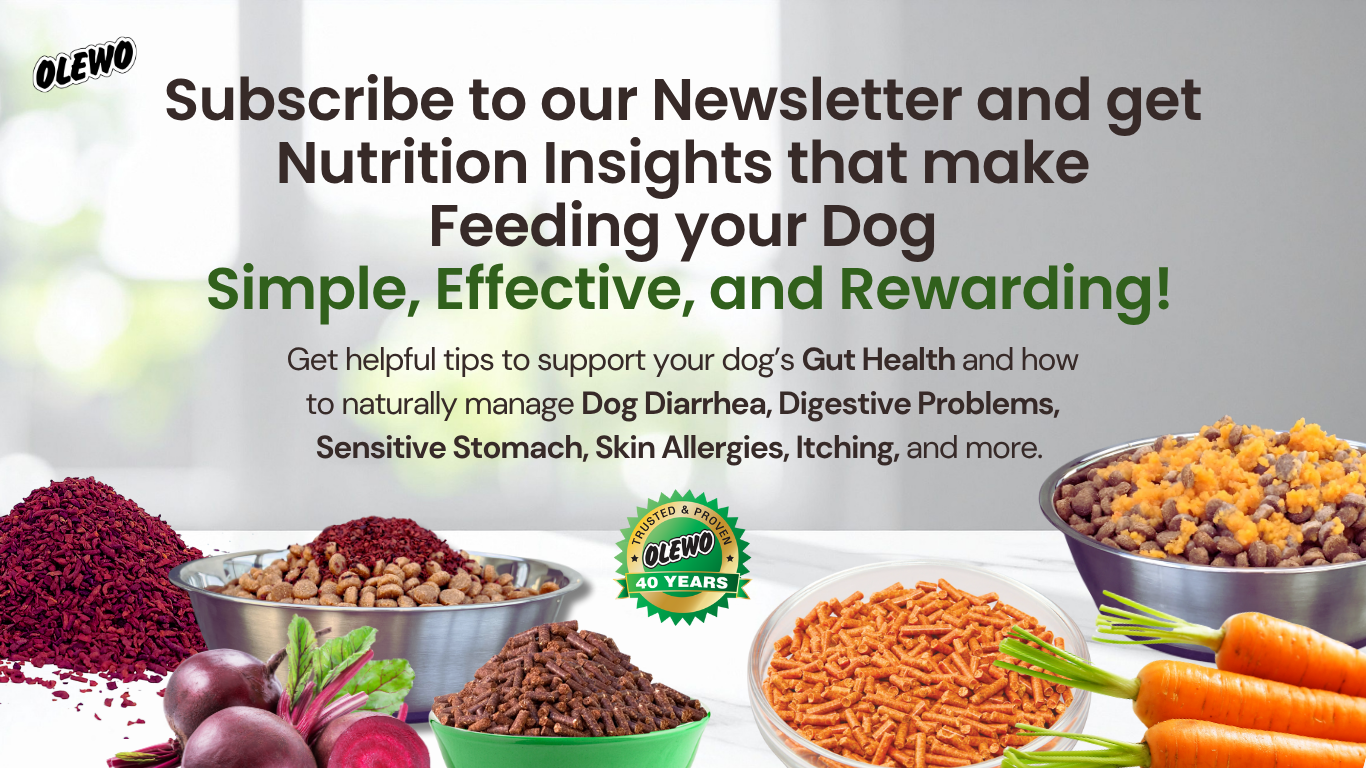
Gut health literally affects your dog’s entire body and overall health. These days a variety of things wreak havoc on our dogs’ digestive systems including commercial dog foods (especially kibble), antibiotics, steroids, NSAIDS (non-steroidal anti-inflammatory drugs), vaccines, flea and tick treatments, stress, environmental toxins, and more. Pet owners are often struggling to figure out the cause of their dog’s ailments and to get their health back on track.
Many Seemingly Unrelated Diseases are Caused by Gut Problems
We are not just talking about digestive issues like dog diarrhea alone, as gastrointestinal health can be the root cause for many other health issues. You might not attribute digestive problems to skin allergies, joint pain, heart disease, seizure disorders, behavioral abnormalities, autoimmune diseases, and even certain types of cancer, but many diseases that appear to be unrelated are actually caused by gut problems.
Your dog’s gut health is extremely important because the gastrointestinal system is largely responsible for the critical functions of the body’s digestive and immune systems. And it affects not only the body’s digestion and immune responses, but also vitamin production, vitamin and mineral absorption, hormone regulation, the ability to eliminate toxins, and even mental health.
Symptoms of Poor Gut Health
Symptoms related to poor gut health can be as obvious as dog diarrhea, bloating, flatulence, bad breath, weight fluctuations, food sensitivities, but also less obvious like allergies, skin issues, joint pain, immune system weakness and lethargy. Dogs suffering from irritable bowel syndrome, or leaky gut are more likely than others to also develop autoimmune disease and mental issues.
The health of our dogs’ gastrointestinal system is determined by levels and types of bacteria in the digestive tract. Ideally there should be a balance of bacteria, however, an imbalance between beneficial and harmful bacteria often results in gut dysbiosis, also known as “leaky gut”.
Dysbiosis and Leaky Gut
According to Dr. Becker, dysbiosis and leaky gut are two names used for the same disorder, but because definitions for each are somewhat different, it makes things unnecessarily confusing. She explains it as follows:
“Dysbiosis is often defined as an imbalance of gut bacteria – too few friendly bacteria and too many opportunistic or pathogenic (bad) bacteria. Leaky gut syndrome is defined as the inability of the intestinal lining to prevent undigested food particles or potentially toxic organisms from passing into the bloodstream.
I think it’s simpler to look at the situation this way: the imbalance of bacteria is what causes the problem – inadequate supplies of good bacteria, plus an overgrowth of bad bacteria, and sometimes yeast. This bacterial imbalance leads to inflammation of the membranes of the intestine, which results in the condition known as dysbiosis or leaky gut.
Dysbiosis in pets is more often acknowledged by holistic veterinarians than by the traditional veterinary community. Holistic and integrative vets believe the consequences of dysbiosis in the pet population are just as significant and devastating as in humans”.
I have personally experienced many health issues caused by leaky gut, and I agree with Dr. Becker that leaky gut in pets can be just as devastating as in humans. You can read my personal leaky gut story, and how it relates to our pets. Just like leaky gut in pets is more often acknowledged by holistic veterinarians then by traditional veterinarians, in my own case, traditional doctors were not able to help me either other than just treating my symptoms. It was an alternative doctor who determined the root cause of my condition, provided a proper diagnosis, and helped me heal my body naturally through changes in diet and appropriate supplementation.
A Dog’s Diet and Leaky Gut
The type of food that dogs are fed and their bodies have to process can have a huge affect on their bodily functions, including the brain. When the gut is healthy, the dog is overall healthier, and the brain is happier.
However, when dogs are fed highly processed foods, the gut becomes damaged over time and therefore less functional. The proteins in commercial pet foods are not only difficult to digest, process, and assimilate because they have been altered by the extreme processing of the food, they are also filled with additives and preservatives, all allowing bad bacteria to grow in the gut.
If the gut bacteria is out of balance, the intestinal lining becomes inflamed and begins to leak the larger, partially digested substances from food particles and toxic organisms into the bloodstream. These large complex substances are allergenic and stimulate the immune system to produce antibodies against them.
Preventing Leaky Gut

Our dogs need REAL, WHOLE FOODS in order to be healthy and thrive, and to prevent disease. Just feeding processed, commercial dog foods is not good enough. Good nutrition doesn’t come out of a bag. Many pet owners think it is okay to feed kibble because their dog appears to be doing just fine. The truth is that it can take years before an outward problem manifests from poor nutrition.
One day you may wake up and find that your dog all of a sudden can’t stop scratching, has skin issues that won’t go away, has diarrhea that doesn’t go away, has stopped being active because of joint pain, or even had a change in temperament. While these changes are visible all of a sudden, they are more than likely caused by a combination of long-term inflammation, overload of toxins, and a compromised gut.
We have to do better for our dogs, they are counting on us. If you don’t want to wake up with regrets one day, you need to re-think what you are feeding. Dogs need quality protein, quality fats, and a small amount of vegetables – especially vegetables rich in carotenoids (alpha-carotene, bets-carotene, beta-cryptoxanthin, lutein, zeaxanthin, and lycopene) like carrots. While carotenoids are not considered essential nutrients, they contain important compounds that are important to health including antioxidant and anti-cancer activities.
You may be clueless about feeding your dog food that doesn’t come out of a bag or box, and no doubt about it, it can be hard and overwhelming at first to make changes. You may also think you don’t have the time to prepare real food for your dog because life is busy, but when your dog’s health is at stake, you just have to do it.
Whether you choose to feed raw or home cook your dog’s meals, it really isn’t as hard as you think. There are many resources available to help you guide through these changes. Keep the Tail Wagging is great resource for new raw feeders and there are many great books out there for simple homemade food like Dr. Becker’s Real Food for Healthy Dogs and Cats.

Healing Leaky Gut
If you feel like your dog’s gut has already been compromised, look for a holistic or integrative veterinarian who can help reverse and repair the damage that’s been done to your dog’s gut over the years from unhealthy, highly processed dog foods diets or imbalances. Through testing for food sensitivities, applying nutritional changes, and proper supplementation, it is entirely possible to restore the full health of your dog’s GI system. Find a vet that understands and utilizes the “4 R’s” of gastrointestinal and digestive health – Remove; Replace; Repair; and Rebalance.
A good protocol will first remove the problem foods and toxins from your dog’s system that could be causing issues, and then replace your dog’s diet with healthy, healing foods that contain key nutrients. Specific supplements will repair nutritional deficiencies, and the right probiotics will rebalance the gut bacteria. This is how I personally healed my leaky gut, and not only did it restore my digestive health, but my overall heath – and this approach will work for pets as well.


Leave a Reply